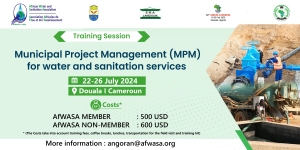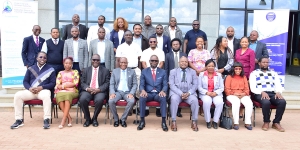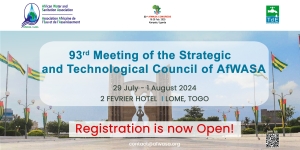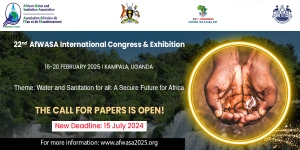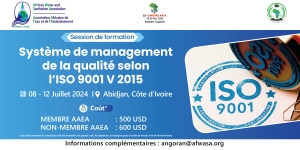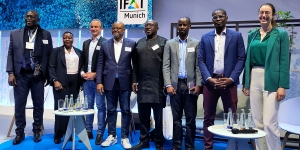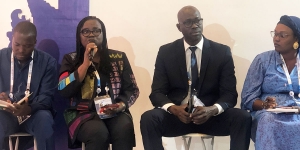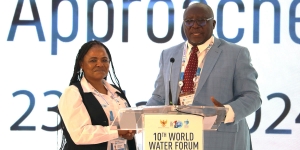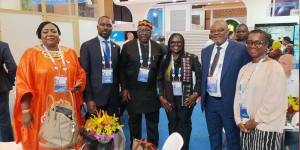Nzickonan Stéphanie
The 95th AfWASA Meetings will be held from July 21-24, 2025 in Lilongwe, Malawi
AfWASA to train municipal technicians in municipal project management
Training Objectives
-
Take stock of the implementation of communal project management;
-
Explain the concept of communal project management;
-
Define the role of municipal project management assistance;
-
Be familiar with the dimensions and tools of municipal project management assistance;
-
Identify the actions to be taken in the context of municipal project management for water and sanitation services
Content
The following content will be developed in order to achievethe above objectives
-
Description and analysis of municipal project management practices in drinking water and sanitation;
-
Municipal project management: Concepts and issues in decentralisation;
-
Municipal project management: actors, roles and responsibilities;
-
Municipal project management: dimensions and tools ;
-
MPM experiences: the case of Bafoussam in rural and urban areas;
-
Communal responsibility for water and sanitation: foundations and content;
-
Users' expectations and the principles of local public service in water and sanitation;
-
Key concepts in municipal project management process;
-
Municipal development planning;
-
Management of municipal assets (infrastructure);
-
The plan for reinvesting what has been learnt.
AfWASA trains operators to control water losses in distribution networks
On the initiative of AfWASA, some experts from Côte d'Ivoire, Ghana, Malawi and Uganda are taking part in a training session in Malawi, on Optimizing Drinking Water Networks Management to Reduice Non revenue Water.
The training was officially opened by Mr. Elias Chimulambe, the Principal Secretary for Ministry of Water and Sanitation for Malawi.
To find out about our upcoming training sessions, please, click on https://training.afwasa.org/
Participate in the 93rd Meeting of AfWASA Strategic and Technological Council!
The African Water and Sanitation Association (AAEA) is pleased to announce that registration for the 93rd meeting of its Strategic and Technological Council is now open. This event will be held from July 29 to August 1, 2024 in Lomé, Togo.
Register here ===>: https://meetings.afwasa.org
Why take part?
The Lomé conference represents an invaluable opportunity for AfWASA to strengthen the resilience of water and sanitation companies to the challenges posed by climate change. By bringing together experts, operators, industrialists and policymakers, this event will share crucial knowledge, explore innovative solutions and forge strategic partnerships. The diversity of the programmed activities, ranging from discussion panels to specialised workshops and field visits, ensures a holistic and practical approach to current issues. This initiative will help strengthen the institutional and technical capacities of AfWASA members, ensuring a more sustainable and resilient future for African people dependent on these essential services.
Program overview
Opening ceremony attended by the country's highest authorities
High-level panels presented by international and regional experts.
Work by specialist groups: to share technical expertise and knowledge and finalize action plans to be implemented.
Field visits: to observe, understand and evaluate the practices, technologies and systems in place in Togo to tackle climate change.
Exhibition: to showcase the latest technologies and solutions from companies and organizations in the sector.
How to register?
Your membership code will be required for your registration. If you have forgotten it, please contact our Membership Services at: This email address is being protected from spambots. You need JavaScript enabled to view it.
Click on the link to Register ===>: https://meetings.afwasa.org
Join us in Lomé and be at the heart of the discussions that will shape the future of water and sanitation in Africa.
Abstract submission deadline has been extended to July 15, 2024
Dear Valuable Friends of the Water and Sanitation Sector,
We are pleased to announce that the deadline for abstract submission for our 22nd International Congress and Exhibition Kampala2025 has been extended to July 15, 2024.
We encourage authors to submit their abstracts by this date.
Should you have any questions or require assistance in submitting your papers, please do not hesitate to contact us at This email address is being protected from spambots. You need JavaScript enabled to view it..
We look forward to hearing about your contributions and welcoming you to Uganda, "the Pearl of Africa", for this global event.
Together, let's advance solutions for sustainable water and sanitation management in Africa.
For more information, please visit the Congress Website
AfWASA kindly invites you to its upcoming training session
Objectives
Manage customer relations in compliance with ISO 9001:2015 QMS requirements
Master Quality and safety environment
Understand the concepts and challenges of customer management
Apply the principles and requirements of ISO 9001:2015 to improve customer
Satisfaction
Know how to manage customer relations effectively
Content
General information on quality management
Definition of some quality concepts
History of quality management
The family of quality standards
The various changes to ISO 9001
The seven management principles of ISO 9001/2015
Quality issues
ISO 9001 version 2015 and customer management in companies
The concept of customer management
The challenges of customer management
Normative references according to ISO 9001 and customer management
The challenges of customer management in African water utilities
The benefits of customer management for a utility
...
Click here to upload the french brochure
For registration, please on the link: https://training.afwasa.org/formation/registration/form-training/121
For more information, send an email to This email address is being protected from spambots. You need JavaScript enabled to view it.
AfWASA at IFAT Munich 2024: a strategic participation to reinforce its leading position in capacity building for African Water and Sanitation stakeholders
From May 13 to 17, 2024, members of the African Water and Sanitation Association took part in IFAT, the world's leading trade fair for the water, water treatment, waste management and raw materials industries, held in Munich, Germany.
The aim of their participation was to discover the sector's technological and methodological advances, forge strategic links and strengthen their capacities to better meet Africa's water and sanitation needs.
During the event, the delegation took part in various key sessions including presentations to share recent project successes and challenges in Africa, networking sessions to extend influence and forge future collaborations, and field visits to observe recent technologies and their applicability in Africa.
Interactions with renowned companies such as ABB, Siemens, and Wilo, and discussions at the Africa-Special event highlighted innovations tailored to Africa's unique needs. These collaborations enrich AfWASA's experience and demonstrate the value of a collective approach to solving industry challenges.
Speaking at the show, Mr. Olivier Gosso, Executive Director of AfWASA, who led the delegation, said: “These innovations mark the beginning of a transformation in our approach to water management in Africa. The collaboration with GWP has helped to highlight Africa's specific challenges and promote our future initiatives”.
AfWASA members' participation at IFAT was made possible thanks to the facilitation of German Water Partnership (GWP), an AfWASA partner. Mr. Boris Greifeneder, Executive Director of GWP, commented on the collaboration of the 2 organizations: “AfWASA and GWP have been working together in close partnership for several years now, and we have enjoyed many joint successes. This now includes IFAT Munich 2024. We were delighted to have AfWASA represented on the joint GWP stand and to welcome a delegation from the AWASA project. We were also able to organize two joint panels as part of the IFAT events program. AfWASA, with its members covering the African continent and its wide range of expertise, is a very valuable partner when it comes to the issue of the global water transition and its solutions.”
Mr. Ibrahim Sow, President of the Panafrican Association of Sanitation Actors (PASA), for his part, expressed the significant impact of the fair for his members: “We discovered innovations that are transforming our industry, from improved septic tank design to new truck models equipped with cutting-edge features. Economical and practical septage treatment systems promote sludge reclamation, which is crucial to our industry”.
Christian Kouadio from WILO commented: “Taking part in IFAT Munich is not just about showcasing our innovations. It includes promoting our 'ecolution' concept, which aims to offer innovative, ecological and economical solutions to the challenges facing the sector”.
It is worth noting that AfWASA's participation in IFAT Munich 2024 has strengthened its leadership role in Africa's water and sanitation sector, while enriching knowledge and inspiring appropriate strategies to improve water resource management on the continent.
10th World Water Forum: Dr. Ackun calls for gender mainstreaming in school education modules
As part of the 10th World Water Forum being held in Bali, Indonesia, Dr AcKUN Leticia, AfWASA's Gender Specialist, took part in a session on "Gender and access to EHA, what management and financing mechanisms to guarantee inclusion: the practical case of schools".
On this occasion, she emphasized the importance of gender mainstreaming both in designing EHA facilities and in school modules, as well as empowering young people through the creation of Water, Sanitation and Hygiene (WASH) clubs to reinforce their leadership and civic responsibility.
Several experts took part in the session.
Mr Harouna DERA, Sanitation Associate at Global Green Growth Institute (GGGI) Burkina Faso, presented the financing mechanisms put in place by GGGI to facilitate access to WASH facilities in public spaces (schools, stations, markets, etc.). A process that can be readapted to improve access to WASH services in schools.
Mr. Omar SENE, Director of Sanitation Senegal, presented the gender-sensitive toilets set up by the Sanitation Department as part of its WASH program in schools. These toilets are adapted for people with disabilities and girls and take Menstrual Hygiene Management into account in their design.
Ms Rouguiyatou Ba NIANG, Project Manager at EDE International and head of the sub-committee at Senegal Young Water and Sanitation Professionals Association (AJPEAS), talked about the mechanisms for managing WASH facilities in schools, and presented the biofilter toilets set up by the Association as part of the project to treat and reclaim sewage sludge in the Niayes wetlands.
Ms. Awa GUEYE, Water and Sanitation Engineer and Head of the sub-committee communication-marketing at AJPEAS, moderated the session and presented the "WASH SCHOOL" concept implemented by AJPEAS to improve access to WASH services in schools, while considering gender, circular economy, and environmental preservation aspects.
At the end of the session, the following points emerged:
- The importance of integrating gender and WASH concepts, as well as menstrual hygiene, into curricula to initiate younger students.
- Strengthening young people's leadership and civic responsibility by creating WASH clubs and mentoring younger people. The aim is to prepare the next generation from an early age.
- Ensure the proper management of these facilities to ensure their sustainability.
10th World water Forum: AfWASA and WRC launch the African Hub of Testing Platforms for Water and Sanitation Innovations
On the sidelines of the 10th World Water Forum in Bali, Indonesia, AfWASA and the Water Research Commission South Africa have launched the African Hub of Testing Platforms for Water and Sanitation Innovations that will be set up in the 5 sub-regions of Africa. Africa Water Innovation Hub aims to create a vibrant innovation ecosystem in Africa, which fosters entrepreneurship, creativity, technological transformation, indigenous knowledge modernization, and digitalization. The Hub will bring together users (municipalities, African water and sanitation utilities, universities and research centers, technology developers and business partners with new and emerging innovative solutions. This ecosystem will improve water and sanitation services and the quality of life of its African populations. The Hub will serve as a catalyst for growing innovation, water security, economic growth and sustainable development. It will seek to be inclusive and empowering.
The main objectives of the hub are (1) to Foster a culture of innovation and entrepreneurship through collaboration and knowledge sharing; (2) to Match the needs of African countries with innovative solutions; (3) to Establish regional platforms and provide access to networks of test sites across the continent to test the suitability of solutions, adapt them to existing needs, and compare them in terms of functionality, results, and sustainability; (4) To improve the adoption of innovative solutions for the water and sanitation sector and increase Africa's global competitiveness.
The impact of the Africa Water and Sanitation Innovation Testing Hub could help address local and African water and sanitation challenges, strengthen the innovation landscape, increase adoption and commercialization, expand new equipment in African markets, create jobs and build capacity. This should ultimately drive progress, growth, empowerment, and sustainability.
10th World Water Forum: A Strategic Participation of AfWASA
Under the leadership of Executive Director François Olivier GOSSO, an AfWASA delegation is taking part in the 10th World Water Forum in Bali, Indonesia, from May 18 to 25, under the theme "Water for shared prosperity".
Indeed, while the new 2024-2028 strategic business plan, which will guide the continued growth of the organization's activities over the next 5 years, is currently being drawn up, the Bali forum is a strategic opportunity for AfWASA's new leadership to focus its participation on three points:
Cooperation; with both African and international technical and financial partners,
Sector financing and,
Gender inclusion (women and youth).
In terms of cooperation, the sessions in which AfWASA is taking part will not only help to identify areas of focus in relation to sectoral challenges in Africa, but also potential partners with whom to forge the future partnerships needed to support initiatives aimed at improving water and sanitation services in Africa. It goes without saying that the identification of funding sources will enable the implementation of the activities planned within the framework of the various expected collaborations.
Through sessions dedicated to women and young people, this forum will provide an opportunity to strengthen our approaches and consolidate the effectiveness of gender inclusion (women, young people) and the promotion of their full participation in sector activities, essential for sustainable development in the water and sanitation sector in Africa.
About the World Water Forum
The World Water Forum is organized every three years by the World Water Council in collaboration with a host country. It brings together participants from all levels and areas, including politics, multilateral institutions, academia, civil society and the private sector. The Forum offers a unique platform where the water community and key decision-makers can collaborate and establish long-term action plans on water challenges around the world.

 English
English  Français
Français 
